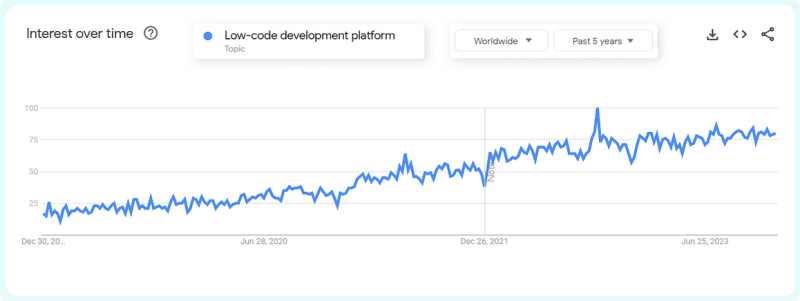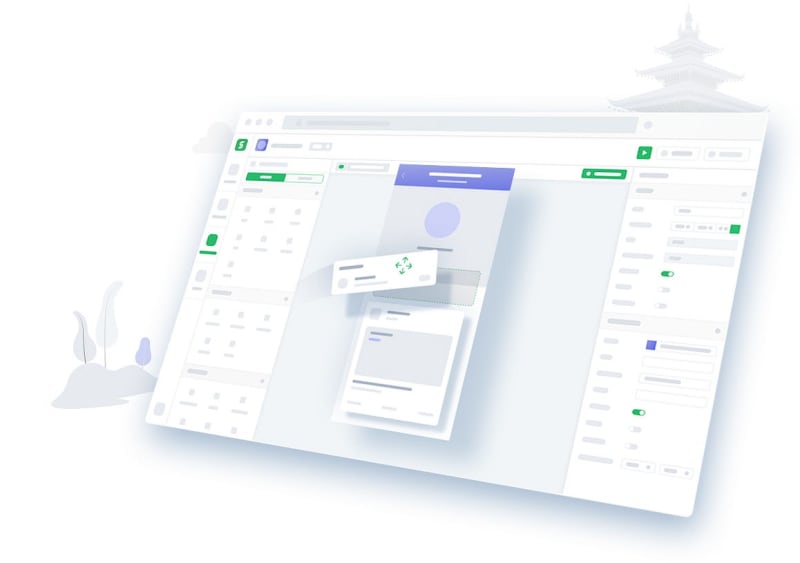Poised to hit $187 billion by 2030, low-code technology continues to be a game-changer for custom application development.

Leveraging low-code platforms has led to increased efficiency, faster development, and the ability to respond quickly to changing market needs. These factors collectively contribute to higher customer and new client retention, more new projects, and faster buy-in from stakeholders.
Low-code apps are the future
In the past, the only way for a business to build a new app was to hire a highly specialized developer or agency. It took a full tech design, proficiency in a bunch of coding languages, and lots of time.
Not anymore. Low-code apps are changing how businesses can go digital.
By 2024, it is projected that 65% of development will be driven by low-code methodologies. 70% of new business apps will use low-code tech by 2025.
Key Reasons for the Sustained Market Growth of Low-code Development Platforms
According to Nucleus Research, there has been an uptick in organizations self-building complex applications using low and no-code tools, including full-fledged ERP, payroll systems, customer and supplier portals, and project management solutions. Key low-code capabilities that reinforce
1. Swift Prototyping: Redefining the Development Landscape
By eliminating the need for coding from scratch, components can be dragged and dropped, significantly reducing initial prototyping time.
Forrester reports that low-code development can lead to a 10 times faster application delivery compared to traditional methods.
According to McKinsey & Company, companies embracing agile and DevOps practices, often facilitated by low-code, can reduce time-to-market by 20–30%.
2. Integration with Advanced Technologies
Low-code platforms offer robust integration capabilities with existing systems and APIs. This is essential for custom application development companies, as they often need to ensure that the applications they develop can seamlessly integrate with their clients’ existing IT ecosystems.
In addition to easy REST, GraphQL, and gRPC API configuration, DronaHQ low-code development platform sports a library of over 70 ready connectors to databases and applications.
3. Increased Developer Productivity
Professional developers benefit from low-code platforms by focusing on intricate coding tasks while leveraging pre-built components.
85% of developers report heightened productivity when using low-code, showcasing its positive impact on developer efficiency.
Teams can take on more projects simultaneously without compromising quality, thereby enhancing overall productivity
4. Cost-Efficiency:
Lower development costs are a key factor. Appian, a low-code platform provider, reported in a study that organizations using low-code can achieve a 50% reduction in development costs compared to traditional methods.
Companies leveraging low-code experience a substantial reduction in resource utilization, with up to 70% fewer resources required compared to traditional app-building platforms.
5. Democratization of Development: Empowering Diverse Skill Sets
Low-code platforms empower a broader range of professionals to contribute to the development process. The visual interface opens the door for developers with varying skill levels, reducing the dependence on highly specialized talent.
A Mendix survey revealed that 25% of their low-code developer community had no background in coding, with 70% of those without any low-code experience learning to build applications in one month or less.
With low-code platforms, custom application development companies can tap into a broader talent pool and utilize a more diverse range of talents, including business analysts and other non-technical staff.
6. Alignment with Digital Transformation
Low-code is not just a development methodology; it’s a strategic tool for driving digital transformation.
TechRepublic reports that 66% of IT leaders adopt low-code to propel their digital transformation initiatives, showcasing its role in shaping the future of business.
Benefits for Custom App Development Agencies
The increasing adoption of low-code is creating a demand for developers with expertise in this technology. Businesses, including mom and pop shops, e-commerce, and others, need custom apps, creating job opportunities for low-code developers.
Digital agencies embracing low-code development platforms stand to gain numerous advantages that transcend mere efficiency. The intersection of accelerated development, resource optimization, and enhanced collaboration reshapes the landscape for agencies, fostering growth, client satisfaction, and innovation.
a. Client Buy-In Acceleration: From Ideas to Approvals in Record Time
One of the standout benefits for agencies lies in the ability to expedite the client buy-in process. Low-code platforms facilitate rapid prototyping and iteration. The visual interface enhances collaboration during the early stages of development, making it easier for clients to comprehend and interact with evolving applications.
A survey by OutSystems reports that 66% of IT professionals using low-code platforms experienced improved collaboration with business stakeholders, emphasizing the pivotal role it plays in securing client buy-in.
b. Expedited Time-to-Market: Gaining a Competitive Edge
Time is often a critical factor in the competitive agency landscape. Low-code platforms significantly reduce development timelines by leveraging pre-built components and templates. This accelerated time-to-market not only meets client expectations promptly but also positions agencies with a distinct competitive edge in rapidly evolving markets.
According to industry projections, businesses leveraging low-code are expected to deploy solutions 10 times faster than those relying on traditional coding methods.
c. Enhanced Output: Scaling Productivity Without Sacrifice
The efficiency gains derived from low-code development translate directly into increased output for agencies. The ability to take on multiple projects simultaneously without compromising quality elevates overall productivity and revenue-generating potential.
d. Simplified Maintenance: Adapting Swiftly to Changing Needs
Maintaining applications is simplified with low-code, ensuring agencies can adapt swiftly to changing business needs. The visual interface allows for quick updates and modifications, reducing the likelihood of errors in the maintenance process.
e. Transparent Pricing Understanding: Fostering Trust and Alignment
Low-code platforms often operate on clear and transparent pricing models. This includes combining tool license fees with the agency’s services. This transparency enables agencies to provide accurate quotes to clients, fostering trust and ensuring alignment between expectations and costs.
Not just a trend; a path to growth for Your Agency
As we look towards 2024 and beyond, the sustained market growth of low-code signifies its enduring impact on the way we conceive, build, and deploy applications.
For digital agencies, embracing low-code is not just an option; it’s a strategic imperative for staying ahead in the competitive landscape of custom app development.
The low-code revolution is reshaping custom app development, and your agency can be at the forefront of this transformation.
At DronaHQ, we offer a comprehensive low-code platform, along with a range of other capabilities, to help your agency create and publish high-quality webb and mobile apps in less time, and for less money.
Get a free trial and discover the benfits of using low-code tools at your development agency. You can also directly apply for Partner Program to explore benefits.






Top comments (0)